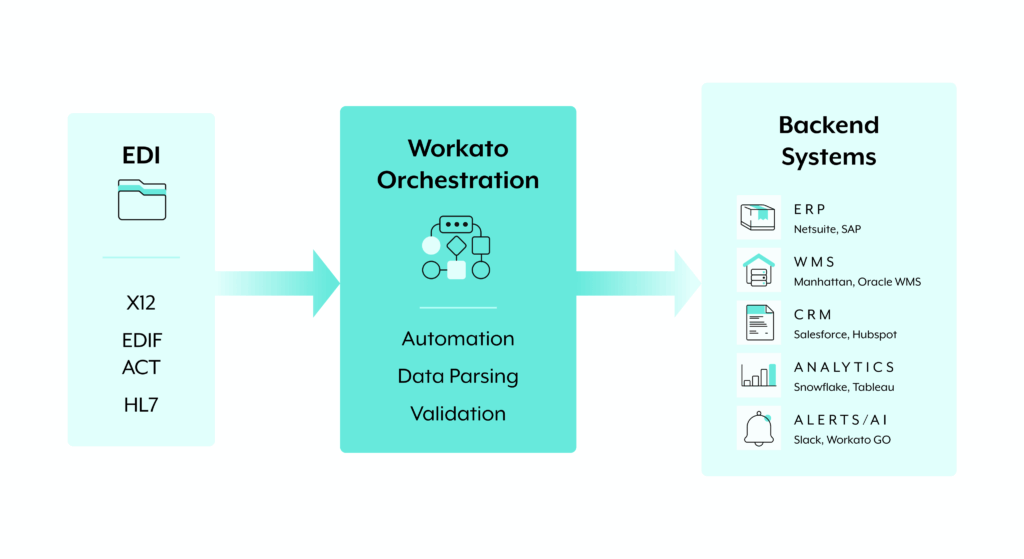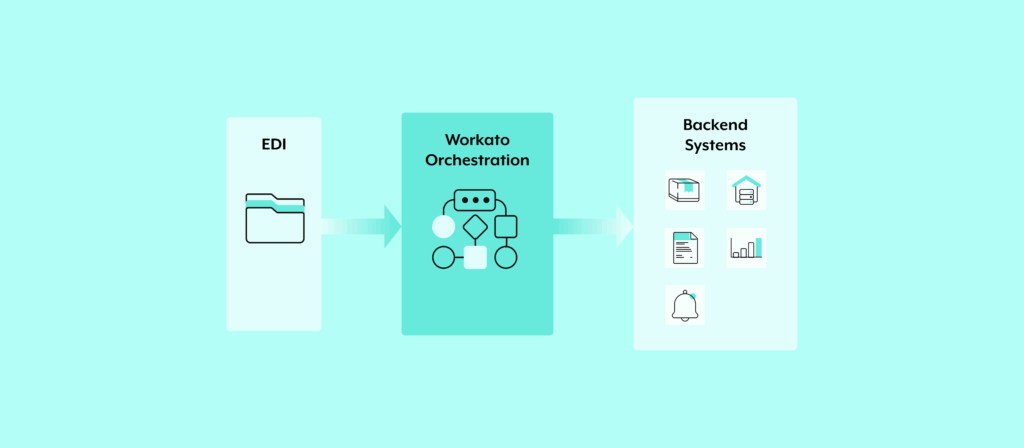EDI Isn’t Dead, But It Does Need Orchestration
For decades, Electronic Data Interchange (EDI) has served as the invisible backbone of global commerce. It enables structured, standardized data exchange between trading partners – from suppliers and distributors to logistics providers and retailers. And despite whispers of its demise, EDI isn’t going anywhere.
In fact, in an age obsessed with agility and efficiency, EDI’s rigid standards and compliance-driven protocols are exactly why it endures. But that same rigidity is also what makes it ripe for reinvention.
The Problem Isn’t EDI. It’s What Happens After the Data Arrives.
Think of EDI as the infrastructure, the pipes that carry high volumes of business-critical transactions like purchase orders, shipping notices, and invoices. But once those documents arrive, many businesses still rely on manual processes to interpret and act on them: copying data into spreadsheets, rekeying orders into ERPs, chasing down shipping confirmations.
This “last mile” is where delays, errors, and compliance risks pile up, especially for organizations managing hundreds or thousands of EDI transactions per day.
Why EDI Needs iPaaS and Orchestration
Modern integration platforms like Workato extend the value of EDI by making the data actionable. They don’t replace EDI, they amplify it. Here’s how:
- Workflow automation: Every EDI transaction can become a trigger for downstream action – automatically create sales orders in NetSuite, sync shipment data to your warehouse system, or send real-time alerts to key stakeholders. Instead of manually stitching together processes, automation ensures things just flow.
- Compliance and auditability: With automation, every step of the EDI lifecycle is tracked: what was received, when, how it was processed, and what was sent back. This not only supports audit readiness but ensures your team is always aligned with trading partner requirements, minimizing the risk of penalties or lost relationships.
- Reporting and analytics: While many EDI systems offer native dashboards, automation goes further by turning each transaction into a trigger for real-time visibility across your entire stack. Instead of siloed logs or spreadsheets, teams get integrated dashboards that surface actionable insights, not just within the EDI system, but across connected applications like ERPs, WMSs, and analytics tools. You gain a unified view of order volume, partner performance, fulfillment status, and inventory health, enabling faster decisions and tighter operational control.
- Scalability: As your business grows, so do your transaction volumes. Automation helps you scale without adding headcount by eliminating manual steps and reducing human error. Whether you’re managing 100 orders or 100,000, your systems stay fast, accurate, and responsive.

Why EDI Automation Matters Now
Businesses today are demanding automation across every channel – e-commerce storefronts, CRM systems, partner portals. EDI is just another (very important) spoke in the wheel. But without automation, it becomes the exception, the one channel that still relies on human glue to hold things together.
This isn’t just an SMB problem, either. Many large enterprises still treat EDI as a black box managed by a few specialists with legacy tooling and tribal knowledge. That’s not sustainable. Especially as supply chains become more complex and real-time visibility becomes non-negotiable.
The Skills Gap Is Real
Like legacy ESBs, legacy EDI solutions often require deep technical expertise, knowledge that’s aging out of the workforce. Newer employees aren’t looking to debug XML mappings or troubleshoot failed transactions in custom code. They expect tools that are intuitive, observable, and integrated with the rest of their tech stack.
Platforms like Workato lower the barrier to EDI automation by providing visual development, smart connectors, and built-in error handling, so teams can spend less time wrestling with middleware and more time delivering value.
Case in Point: Owlet Baby Care: Scaling EDI with Orderful + Workato
Owlet Baby Care, a leader in smart infant monitoring, faced challenges as its global supply chain expanded: slow trading partner onboarding, opaque transaction flows, and escalating costs from outsourced EDI processes.
By adopting Orderful’s modern EDI platform integrated with Workato, Owlet transformed its operations:
- 83% faster partner onboarding: New trading partners went live in 1–2 weeks instead of 3 months, accelerating time-to-market.
- 65% reduction in EDI costs: Streamlined automations and real-time error handling reduced manual work and third-party fees.
- 100% transaction visibility: Real-time dashboards let both business and IT teams track EDI transactions end-to-end, improving agility and reducing compliance risks.
This shift turned EDI from a black box into a business advantage, helping Owlet scale with confidence as it entered global retail channels and faced increasingly complex trading requirements.
EDI + Orchestration = Future-Ready
EDI is not a relic. It’s a foundational protocol that, when paired with intelligent orchestration, can unlock massive gains in accuracy, efficiency, and agility. Whether you’re moving pallets of consumer goods to Target or managing sensitive healthcare data, by integrating EDI into a unified orchestration platform, businesses can:
- Automate workflows to eliminate manual steps and accelerate order processing
- Ensure compliance and auditability with complete visibility into every transaction
- Gain real-time reporting and analytics to proactively manage inventory, partners, and operations
- Scale seamlessly without adding headcount or relying on specialized technical skills
This isn’t just an upgrade, it’s a reinvention of how EDI drives business. With the right tools, companies can turn a transactional necessity into a strategic advantage.
It’s time to make your EDI as agile and intelligent as the rest of your tech stack.

